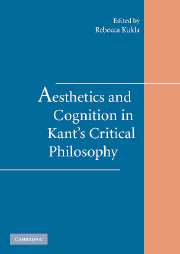Book contents
- Frontmatter
- Contents
- Notes on Contributors
- Acknowledgments
- 1 Introduction: Placing the Aesthetic in Kant's Critical Epistemology
- PART I SENSIBLE PARTICULARS AND DISCURSIVE JUDGMENT
- 2 Thinking the Particular as Contained under the Universal
- 3 The Necessity of Receptivity: Exploring a Unified Account of Kantian Sensibility and Understanding
- 4 Acquaintance and Cognition
- PART II THE COGNITIVE STRUCTURE OF AESTHETIC JUDGMENT
- PART III CREATIVITY, COMMUNITY, AND REFLECTIVE JUDGMENT
- Bibliography
- Index
3 - The Necessity of Receptivity: Exploring a Unified Account of Kantian Sensibility and Understanding
Published online by Cambridge University Press: 24 July 2009
- Frontmatter
- Contents
- Notes on Contributors
- Acknowledgments
- 1 Introduction: Placing the Aesthetic in Kant's Critical Epistemology
- PART I SENSIBLE PARTICULARS AND DISCURSIVE JUDGMENT
- 2 Thinking the Particular as Contained under the Universal
- 3 The Necessity of Receptivity: Exploring a Unified Account of Kantian Sensibility and Understanding
- 4 Acquaintance and Cognition
- PART II THE COGNITIVE STRUCTURE OF AESTHETIC JUDGMENT
- PART III CREATIVITY, COMMUNITY, AND REFLECTIVE JUDGMENT
- Bibliography
- Index
Summary
In the Critique of Pure Reason, Kant attempted to explain just how the sensible matter provided by intuition contributes to the content and grounding of empirical judgment. But many commentators, both Kant's contemporaries and ours, have found his answer ultimately unsatisfactory, and have laid blame on his apparently fundamental distinction between sensibility (the receptive faculty of intuition) and understanding (the spontaneous faculty of concepts). For example, Reinhold (1789) found the distinction and the dualisms it engenders so problematic that he proposed that the idea of representation, common to both sensibility and understanding, should supplant it as an ultimate grounding principle for transcendental idealism. And Davidson's famous rejection of the very idea of a conceptual scheme (Davidson 1984) is targeted at the distinction between conceptual and experiential elements in thought, which he takes Kant's distinction to entail (Davidson 1999, 51). But perhaps the commentators have been wrong, not in finding fault with the idea that these faculties and their contributions to experience and judgment are fundamentally distinct, but in attributing that idea to Kant. In this essay, I explore this theme. I shall first illuminate the difficulties for Kant's account as typically understood, from the standpoint of the question of how sensibility could possibly provide the sort of grounding or guidance for the understanding's operations that could ever yield objective empirical judgment. I shall then turn to John McDowell's recent effort to overcome these worries.
- Type
- Chapter
- Information
- Aesthetics and Cognition in Kant's Critical Philosophy , pp. 61 - 84Publisher: Cambridge University PressPrint publication year: 2006
- 2
- Cited by



